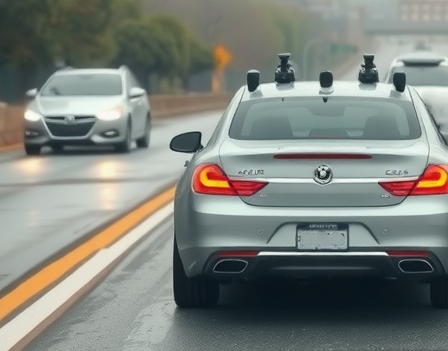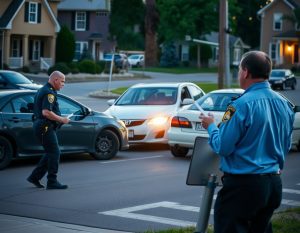Autonomous vehicles are rapidly becoming part of our new reality. Advances in self-driving technology and autonomous vehicle technology are changing the legal landscape for car accidents, personal injury law, and product liability law.
In Illinois, these changes are already challenging traditional concepts of driver negligence and determining fault. This article explores the impact of autonomous vehicles on personal injury law in Illinois, guiding personal injury claims victims through the evolving legal framework.

Determining Liability in Autonomous Vehicle Accidents
Autonomous vehicles are cars that use advanced machine learning algorithms, vehicle sensors, and artificial intelligence to operate with little to no human driver involvement.
Self-driving cars are designed to reduce accidents caused by human error. However, accidents involving autonomous vehicles still occur, and when an accident occurs, determining liability can be complex.
With traditional car accidents, human error is the main factor. The Illinois Vehicle Code and the Illinois Compiled Statutes set clear rules on driver negligence, insurance policies, and legal disputes over car accidents. However, the rise of self-driving vehicles forces the legal system to rethink how fault is determined when accidents involve autonomous technology.
When a self-driving car is involved in an accident, the question becomes whether human drivers failed to exercise reasonable care or whether product defects in autonomous vehicle technology were at fault. Human involvement with self-driving cars varies since there are different levels of car autonomy.
In general, if a driver fails to intervene when an autonomous vehicle encounters unexpected obstacles or behaves irresponsibly, that driver may be held liable. Irresponsible behavior includes sleeping while driving, as one driver did while going over 80 mph in autopilot mode.
On the other hand, if the vehicle’s software provider or manufacturer releases a product with defects or inadequate safety features, they may bear responsibility. An injured party can pursue personal injury claims under product liability law.
Liability in Weather-Related Self-Driving Car Accidents
One study revealed that autonomous vehicles can be affected by weather conditions such as fog and rain, although many accidents also happen in clear, dry weather. In 2022, there were nearly 400 crashes of AVs in just 11 months, the majority being Teslas.
Although the technology of self-driving cars is reported to be rapidly advancing, the older versions of these cars, including 2022 models, are still on the road. They are being used daily by the average consumer, which makes such reports relevant.
As one automated semi-truck company shared, self-driving vehicles have difficulty navigating snow, depending on various factors. One 2024 report shared that mud and dirt are also an impediment for autonomous cars if their sensors are covered.
Another study shares that simply driving in weather that is less-than-ideal reduces the on-road visibility of an autonomous vehicle and impairs its sensors, making it vulnerable. These findings raise valid concerns that if a “perfect storm” of adverse conditions occurs, weather conditions of any sort can contribute to a self-driving car accident.
Driver Error and Human Unpredictability
Driver error and human unpredictability remain critical issues, even in the age of autonomous vehicles. While self-driving cars are designed to minimize human mistakes, they still interact with human-driven vehicles, pedestrians, and cyclists.
An autonomous vehicle’s responses to sudden events may not always align with real-world scenarios. For example, an autonomous vehicle might stop abruptly to avoid a collision, potentially injuring its own passengers if they are unprepared for the sudden deceleration or causing a multi-car collision. Similarly, software delays in responding to fast-moving or complex environments could lead to severe injuries, even if the technology overall reduces accident rates.
These instances underscore that even advanced systems have limitations. Human behavior is inherently unpredictable, and the interaction between automated systems and human-operated vehicles creates a complex dynamic that courts must consider.
Insurance, Safety Standards, and Regulations
Safety standards and laws for autonomous vehicles are dictated by federal and state laws. The FMVSS and NHTSA provide guidelines that every autonomous vehicle must meet before it is allowed on the road. In Illinois, local municipalities are not allowed to restrict or govern the usage of self-driving vehicles. This responsibility is left to the state, which allows both partially and fully driverless vehicles.
Additionally, human drivers may not be required to be behind the wheel of a fully autonomous car, but all car owners are required to have insurance. Manufacturers must also pass rigorous testing, which involves evaluating the vehicle’s sensors, the vehicle’s software, and safety features.
Testing and validation of autonomous vehicle technology not only help in reducing accidents but also support personal injury claims by providing evidence of adherence to or deviation from these standards.
Preparing for a Claim With Legal Help
If you are injured in an accident involving autonomous vehicles, it is critical to seek legal representation immediately. Illinois personal injury law cases involving self-driving vehicles require a comprehensive understanding of both traditional driver error and the technological aspects of autonomous technology.
A knowledgeable personal injury lawyer can help navigate the complex legal framework and determine liability. Whether the fault lies with the human drivers involved, the vehicle manufacturer, or the software provider, an experienced attorney will build a strong case to recover damages such as lost wages, medical expenses, and compensation for injuries caused.
Damages and Compensation
Victims of autonomous vehicle accidents in Illinois may be entitled to compensatory damages covering:
- Medical expenses
- Rehabilitation costs
- Lost wages
- Non-economic damages such as pain and suffering
In cases where it is proven that a manufacturer or software provider’s negligence played a role, punitive damages may also be awarded to deter future misconduct.
How Do Illinois’ Modified Comparative Fault Laws Apply?
Illinois follows modified comparative fault laws, which means that if an injured party is found partially responsible for an accident, his or her recovery may be reduced proportionately. Under Illinois law, when multiple parties contribute to an accident, the court (or jury) assigns a percentage of fault to each party.
A key aspect of Illinois’ modified comparative fault law is the “50 percent rule.” If the injured party is found to be more than 50 percent at fault for the accident, then he or she is completely barred from recovering any damages.
In accidents involving self-driving vehicles, the determination of fault can be more complex. Courts must consider not only the actions of any human driver but also potential defects in the vehicle’s software or hardware. For example, if an accident occurs because the autonomous system failed to detect an obstacle and, simultaneously, the driver was not attentive.
In multi-liability cases, issues can span several disciplines — from automotive engineering to human factors and medical impacts.
Expert witnesses can work together to provide a comprehensive picture of the accident. Their coordinated testimony ensures that all aspects of liability are considered, which is crucial for cases where liability is shared among different parties.
Securing Fair Compensation in the Autonomous Era
Autonomous vehicles are ushering in a new era of technology that is transforming our roads. While self-driving vehicles promise to reduce accidents caused by human error, the legal implications are complex. Illinois personal injury law must now account for traditional driver negligence, product liability issues, and the unique challenges of autonomous vehicle technology.
If you or a loved one is facing legal disputes or personal injury claims as a result of an accident involving autonomous vehicles, understanding the impact of autonomous vehicles on personal injury law is more important than ever.
At our Costa Ivone, LLC, we deliver both small-firm personal attention and big-firm legal experience. We are passionate about justice and aggressive in our advocacy for injured victims.
Contact us today to discuss your case and ensure that you are not held accountable for accidents that were not your fault. Your path to fair compensation and justice starts with a free consultation. Call us anytime, day or night.



